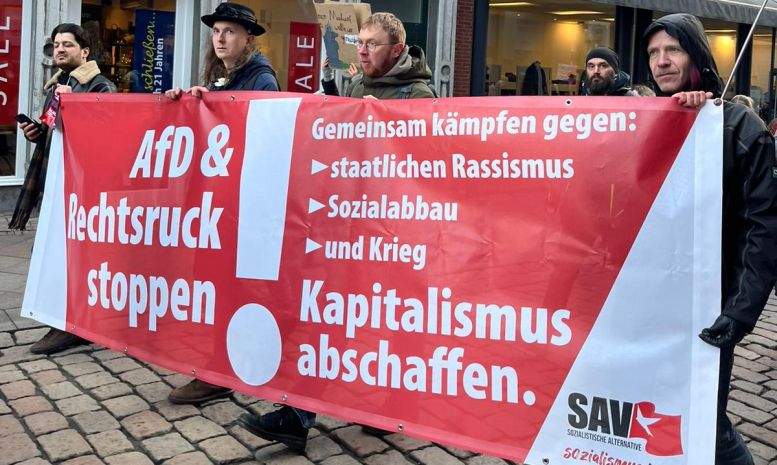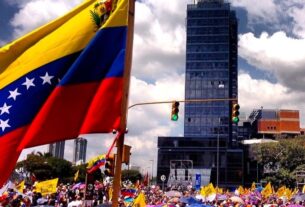Merz Hands AfD a Gasoline Can
Conservative CDU, supported by votes from the extreme right, to shut down Germany’s borders for refugees
Incited by Trump’s brutal rhetoric and actions, the CDU’s candidate for Chancellor, Merz, announced in the beginning of January that he will close the borders from the first day of his chancellorship. In the last session of the Bundestag (national parliament) before the election, which took place on January 29th, the CDU/CSU faction tabled a motion for the sealing off the border, more deportations and expansion of the powers of the border police. The CDU won the vote, supported by the FDP (liberals) and decisively by the extreme-right, semi-fascist AfD (Alternative for Germany). Merz has always spoken of a firewall to prevent the AfD from wielding political power within the German state, now he is starting the fire himself. It is the first time since the end of World War 2 that the extreme right has been a decisive part of a parliamentary majority. There is massive anger boiling and huge demonstrations are being organized. Socialist Alternative (SAV) in Germany calls for the unions to come out decisively to fight against Merz’s racist and illegal plans.
The motion called for an entry ban for all “who do not have valid papers”. This will finally bury the right to asylum, which is already riddled with holes, and any attempt to enter the country without a visa will be considered “illegal.” “Plausibly deportable persons” are to be detained “immediately.” This means people will be detained without having broken the law and without time limits. This is the road to internment camps. The federal police are expected to be able to issue arrest warrants, which has so far been the task of public prosecutors; the police can only execute them. What Merz is proposing violates both EU law and the German constitution.
The CDU is not a solidly extreme right-wing party. But Merz is eyeing the successes of Trump, Meloni in Italy and the Freedom Party in Austria and shifting the emphasis. Racism no longer needs to be hidden — demagogy and toughness are the order of the day. The conscious breaking of taboos is a step towards coalition with the AfD or for a CDU minority government being tolerated or propped up by the AfD if a coalition of the CDU and SPD or another alliance fails in the course of the next few years.
Merz wanted to kill two birds with one stone: the maneuver served to blackmail the SPD and the Greens — “if you join in, I won’t need the AfD votes.” This is intended to train the potential junior partners of a CDU government for their future role of obedience. But the tactic can also backfire. Merz may feel like a German Trump, but unlike the real Trump, he has competition from the right: the racist “original” AfD could benefit from Merz taking on its political positions and take further percentage points from the CDU on February 23.
The lines between state policy and far-right propaganda are blurring, both in the US and in Germany. In the US, the deportation police ICE is threatening to raid schools and hospitals, and fake flyers from ICE have appeared demanding that migrants leave the country immediately. The AfD has distributed “deportation tickets” to immigrants, in reference to a similar action by the Nazi Party, and the CDU is calling for daily deportation flights.
Climate of fear
As early as 2023 and 2024, several steps were taken to restrict the right of asylum at the national and European level. Now it is being argued that these have not been enough, and that a further tightening is needed. Immigration numbers were not particularly high in 2023 and 2024. The CDU/CSU does not base its arguments on facts and figures anyway, but on perceived fears that are reinforced by the media in order to conjure up a “state of emergency.” Several homicides in recent months, including the attacks in Solingen and Mannheim, the murder of six people at the Magdeburg Christmas market and the most recent knife attack in Aschaffenburg, are cited as proof of the alleged intolerability of immigration.
The murders in Magdeburg were committed by a doctor of Saudi origin who is himself an extreme right-winger, hates Islam and sympathizes with the AfD. The warnings of a Cologne refugee initiative about his threats of violence were not passed on by the Ministry of the Interior of North Rhine-Westphalia to his place of residence in Berlin.
The perpetrator in Aschaffenburg, who was from Afghanistan, was in psychiatric treatment and had already attracted attention through acts of violence. CDU member of parliament Julia Klöckner uses the crime to declare war against other “cultures.: “There are cultures that do not agree with our way of life, so we cannot agree with them!” One of the two victims of Aschaffenburg was a two-year-old Moroccan child.
Among refugees, there are people with traumatic experiences of war and violence. Reactionary ideas such as right-wing political Islam have also increased in recent years. Such dangers must not be ignored. However, comprehensive care for people with serious mental health problems, and the massive expansion of specific therapeutic services for victims of war and violence would help more than Klöckner’s culture war and the abolition of the right to asylum.
“We can do it”?
When Merkel proclaimed “we can do it” in 2015 (when 1 million refugees mainly from Syria came to Germany), left-wing campaigners pointed out that ‘it’ is indeed possible, but that the state would have to invest in daycare centers, schools, healthcare, and housing construction so that German-born workers and refugees could not be made to feel that they were competing for scarce resources. No such investment took place. In fact, the social infrastructure has crumbled further since then, and the number of affordable apartments is decreasing. Rising rents and price shocks in energy and food have hit many hard.
And yet, living together has worked out almost surprisingly quite well. This is because the vast majority of refugees have really worked hard to have a better life here despite all the adversity, and because many people — neighbours, colleagues, educators, teachers and social workers — have supported them in this. Syrian immigration, for example, is a success story. Six years after their arrival, despite all the additional challenges and barriers refugees face in finding work, more than half of the Syrians are employed; for men, it is two-thirds. The majority work full-time and earn an average of 2,000 euros per month. One-third of adults are completing a university degree or vocational training. More than 160,000 Syrians had received German citizenship by 2023.
Multiple crises
Fear-based propaganda against migrants works effectively because the world is in turmoil. Conflicts and wars are increasing. More and more countries are ruled by authoritarian regimes, including former “Western democracies.” Jobs are threatened by tariffs and trade wars. People are leaving their homes because of the climate catastrophe, and states are disintegrating. The media ramps up nationalism and increasingly talks about how nations have to prevail against their competitors — economically and militarily. Meanwhile they feature less and less discussion about questions of social justice or redistribution. The instinctive solidarity of working people across national and cultural borders is being deliberately undermined. Refugees involuntarily become the bearers of the bad news of the multiple crises of capitalism.
Parties like the AfD and also the established bourgeois parties are capitalizing off of the justified social fears of declining living standards and wars. Their supposed alternative, however, would mean a massive escalation of these problems through rearmament, militarism and a free ride for destructive fossil capitalism. Implementing the AfD’s economic program, for example, would result in massive redistribution of wealth in favor of billionaires and corporations, fueling poverty, destroying more jobs, and promoting environmental disasters at home and abroad, thus triggering new waves of refugees.
Divide and rule
Immigrants are not responsible for any of the problems in Germany. They are not the cause of economic decline, price shocks, the housing crisis, poverty pensions, or crime. These social ills impact them just as much, if not more, than people who have grown up here.
The focus on migration as a problem serves the pro-capitalist parties by distracting from the real causes, in particular the massive redistribution of wealth in favor of the rich. In 2024, the number of billionaire families in Germany rose to 249, a record level. The average billionaire “earns” an additional 2 million euros every day. 70% of their wealth comes from inheritance. Normal residents, whether born here or newcomers, get their income from work. You never get rich from that. Meanwhile, you can’t even afford a modest apartment in big cities if working is your only source of income, and instead spend 40% of your income on rent.
As long as people are focused on the so-called migration “problem,” the ruling class keeps us busy and can quietly collect their profits without their system being questioned. They are happy to let “those down there” argue among themselves over the breadcrumbs that fall from the table of the rich.
The attacks on the rights of refugees are a testing ground for those in power. If they get away with it, they can try it with others. They first introduce payment cards instead of cash for the refugees and limit their social benefits to food and some hygiene items. But already, the CDU is questioning the basic social welfare for all (called “Bürgergeld” or “citizen’s money”) and is arguing to reduce it to the “essentials.” It is already only just enough to get through the month without hunger.
Making refugees poorer and the further destruction of the right of asylum tends to drive migrants into illegality and thus into jobs without any protection and social security. It can even push a minority towards crime, because they cannot make ends meet otherwise.
Solidarity instead of hatred
The anti-migrant mood has been able to boil over to such an extent because there is no strong resistance from the labor movement. Although the trade unions have generally positioned themselves against the right, they have not developed any counter-strategies against right-wing propaganda and the erosion of the right to asylum, which is also being driven by the SPD and the Greens.
Sarah Wagenknecht has helped to inject agitation against migrants into the Left Party and thus spread the toxic idea that left-wing social policy and xenophobia and racism are compatible. But a labor movement that demands nationally exclusive social policies weakens and divides itself, making it easy for those in power to play us off against each other. Our class interests and the fight against discrimination, xenophobia and racism are inseparable.
The Left Party was too uncritical in singing along with Merkel’s choir of “we can do it,” when it came to accepting large numbers of Syrian refugees, without clearly pointing to and fighting for the necessary wealth redistribution and public investment. It has underestimated the dangers of right-wing propaganda.
Currently, demonstrations against the AfD are taking place in many places, attracting tens of thousands. But politicians from the SPD and the Greens, for example, are also speaking there. They are also responsible for the enrichment of a small wealthy few at the expense of the majority, the crumbling infrastructure and asylum restrictions. In other words, they have helped prepare the ground for the AfD. Even representatives of the CDU are trying to jump on the democracy bandwagon, while their candidate for Chancellor is rolling out the red carpet for the AfD leaders Weidel and Höcke.
Trade unionists, the Left Party, anti-fascist and anti-racist initiatives should take a clear stand and distance themselves from hypocrisy. We say:
- It is not only about the AfD, what is needed now is a campaign against Merz’s illegal border regime
- Unions should come to the fore and mobilize their members against the CDU deal with the AfD and the anti-migrant laws
- Solidarity instead of racism — housing, work, education and health for all.
- For the full restoration of the right of asylum.
- Legal escape routes instead of mass deaths in the Mediterranean.
- Right of residence for all, no to deportations.
- Billions for housing, education, social services and climate instead of for the military and Rheinmetall (Germany’s biggest arms company).
- Cutbacks for the rich instead of austerity for the poor — take the wealth off the billionaires and corporations.
- Fighting the right also means fighting capitalism.
- The real dividing line runs not between nations, but between the working class and the ruling class.
Facts against fear-mongering
Contrary to the general fear-mongering, the number of crimes has fallen significantly since the 1990s. After the pandemic, it rose again for the first time, but it is nowhere near the peak levels. In 2023, as many crimes were committed as in 2010, while the population rose by 3 million from around 82 million to almost 85 million, mainly due to immigration. The number of crimes per capita has fallen.
The number of violent crimes rose in 2023, but has not yet reached the level of 2007, when significantly fewer people lived in Germany. There has been a modest statistical increase in violent crimes committed by immigrants. But there is no direct correlation between national origin and crime. The decisive factor is the poorer social conditions in which refugees live, in addition to experiences of violence in their country of origin and while fleeing. Moreover, violence has also increased in other areas following the pandemic: politically motivated violence (up 6.7%), predominantly from the right, male violence against women (up 7.3%) and violence against children (up 5%).
The capitalists themselves have calculated that around 400,000 people would have to immigrate annually in net terms to compensate for the low birth rate and the shrinking labor force. In 2024, 300,000 fewer people were born than died. 440,000 migrated to Germany in net terms (incoming minus outgoing migration). The majority of immigrants came from EU countries, are not affected by border controls and isolation and are free to choose their place of residence. Refugees came primarily from Syria (80,000 asylum applications), Afghanistan (36,000) and Turkey (31,000).




